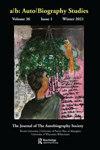Nonpolitical Mann? Faustian Bargains and False Romanticism in Colm Tóibín’s The Magician
Q1 Arts and Humanities
引用次数: 0
Abstract
Abstract This essay explores how Colm Toíbín’s biographical novel The Magician, alongside Thomas Mann’s own writings, exposes contradictions in Mann’s definition of “nonpolitical,” the relationship to today’s culture wars, the risks of virtue signaling and cancel culture, and the Faustian bargain of literary fame and external validation versus empathy and real human connection. Building on her study, Derivative Lives: Biofiction, Uncertainty, and Speculative Risk in Contemporary Spanish Narrative, Rademacher argues that what biofiction does especially well is to illuminate powerful spaces of uncertainty. Such gaps of knowledge and “not seeing” are not internalized, apolitical actions, but expose unsettled, contentious questions that continue to act on our lives. Within this framework, it is fear of and retreat from the uncertain that complicates Mann’s thinking and fiction. Toíbín’s novel exposes how Thomas Mann internalized a false Romanticism that rationalized personal and political forms of detachment and disengagement. In turn, the biofiction reveals how individuals become lost when they use imagination not as a means of contesting reality to understand the always incomplete and evolving nature of the human condition, but in order to conceal or evade this inquiry—deepening deceptive fictions.非政治性的曼吗?科尔姆Tóibín《魔术师》中的浮士德式交易与虚假浪漫主义
本文探讨了科尔姆Toíbín的传记小说《魔术师》如何与托马斯·曼自己的作品一起,揭示了曼对“非政治”定义的矛盾,与当今文化战争的关系,美德信号和取消文化的风险,以及文学名声和外部认可与同情和真正的人际关系的浮士德交易。在她的研究《衍生生活:当代西班牙叙事中的传记小说、不确定性和投机风险》的基础上,Rademacher认为传记小说做得特别好,因为它阐明了强大的不确定性空间。这样的知识差距和“看不到”不是内化的、非政治的行为,而是暴露出未解决的、有争议的问题,这些问题继续影响着我们的生活。在这个框架内,正是对不确定性的恐惧和逃避使曼恩的思想和小说变得复杂。Toíbín的小说揭露了托马斯·曼如何内化了一种虚假的浪漫主义,这种浪漫主义使个人和政治形式的超然和脱离合理化。反过来,这部传记小说揭示了个人是如何迷失的,当他们不是把想象力作为一种与现实相竞争的手段来理解人类状况的永远不完整和不断发展的本质,而是为了隐藏或逃避这种探究——深化欺骗性的小说。
本文章由计算机程序翻译,如有差异,请以英文原文为准。
求助全文
约1分钟内获得全文
求助全文
来源期刊

a/b: Auto/Biography Studies
Arts and Humanities-Literature and Literary Theory
CiteScore
0.80
自引率
0.00%
发文量
27
期刊介绍:
a /b: Auto/Biography Studies enjoys an international reputation for publishing the highest level of peer-reviewed scholarship in the fields of autobiography, biography, life narrative, and identity studies. a/b draws from a diverse community of global scholars to publish essays that further the scholarly discourse on historic and contemporary auto/biographical narratives. For over thirty years, the journal has pushed ongoing conversations in the field in new directions and charted an innovative path into interdisciplinary and multimodal narrative analysis. The journal accepts submissions of scholarly essays, review essays, and book reviews of critical and theoretical texts as well as proposals for special issues and essay clusters. Submissions are subject to initial appraisal by the editors, and, if found suitable for further consideration, to independent, anonymous peer review.
 求助内容:
求助内容: 应助结果提醒方式:
应助结果提醒方式:


